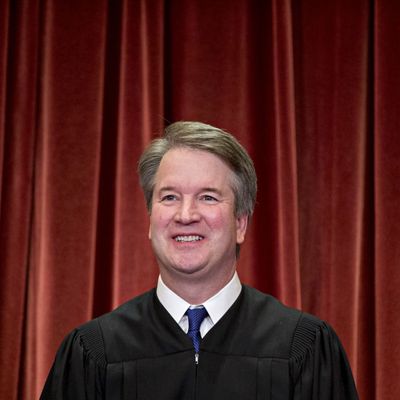
In a development that people on both sides of the reproductive rights barricades have been watching closely, the Supreme Court has accepted a case involving a Louisiana law that is extremely similar to the Texas law that the Court struck down the last time it considered a major abortion case — which was before Anthony Kennedy retired. As the Guttmacher Institute noted earlier this week, the Louisiana case, June Medical Services v. Gee, is a test of whether SCOTUS will now begin its long-anticipated effort to erode, if not abolish, a federal constitutional right to an abortion now that Trump appointee Brett Kavanaugh has replaced Kennedy:
This should be an easy one for the justices. Admitting privileges for abortion providers do not provide health or safety benefits for people seeking abortion care and are a blatant attempt to shut down providers and reduce access. The Court recognized as much in 2016, when it struck down an identical Texas restriction in Whole Woman’s Health v. Hellerstedt. Following that precedent, a federal district court struck down the Louisiana law in 2017.
Yet in a move clearly intended to put the question of how far states can go in restricting abortion back before the Supreme Court, the U.S. Court of Appeals for the Fifth Circuit reversed the lower court and upheld the Louisiana law in 2018. That decision has been appealed to the Supreme Court, and what the Court does next will have a significant impact on abortion rights and state efforts to restrict them.
Since it takes only four justices to accept a case, it’s possible the outcome is not foreordained. Indeed, by quietly refusing review (if doing that “quietly” was somehow possible), the Court could have let the Fifth Circuit decision stand and signaled to states that it was again constitutionally kosher to enact so-called TRAP (Targeted Regulation of Abortion Providers) laws, which prior to the stop sign put up by Whole Women’s Health had become the favored strategy of anti-abortion lawmakers for negating the practical ability to secure an abortion by shutting down providers.
While everything we know about Brett Kavanaugh (including the careful Federalist Society/Heritage Foundation vetting process that put him on Trump’s SCOTUS short list) suggests he will happily gut abortion rights over the long term, he might not be thrilled about doing that so early in his tenure, and just before his great benefactors, Donald Trump (who appointed him) and Susan Collins (who supplied the key vote in his Senate confirmation), face voters. And even though Chief Justice John Roberts was in the minority on Whole Women’s Health, he is famously disinclined to rock too many boats on major precedents, undermining the Court’s reputation for stability and nonpartisanship.
Still, the hopes and dreams of the large anti-abortion element of the Republican Party’s base will now focus on this case, which will be pending even as the white-hot 2020 election year unfolds, as the Associated Press noted:
The justices won’t hear arguments until the winter and a decision is likely to come by the end of June, four months before the presidential election.
The Court could kick the can beyond the election, and even if it does rule to uphold the Louisiana law, it might very well do so while claiming it is not reversing any precedent, as Vox’s Ian Millhiser and Anna North point out:
The conservative United States Court of Appeals for the Fifth Circuit, for what it’s worth, claimed that factual differences between Gee and Whole Woman’s Health justified upholding the Louisiana law even after the Supreme Court struck down the nearly identical Texas law at issue in Whole Women’s Health. Judge Jerry Smith’s opinion for the Fifth Circuit suggests that it may be easier for doctors to obtain admitting privileges in Louisiana than it is in Texas.
By torturing the prevailing “no undue burden” standard for allowable abortion restrictions into near meaninglessness, the Court could begin the long march back to the pre-Roe era while trying to cover its tracks. But it won’t be easy now. The whole world is watching.





